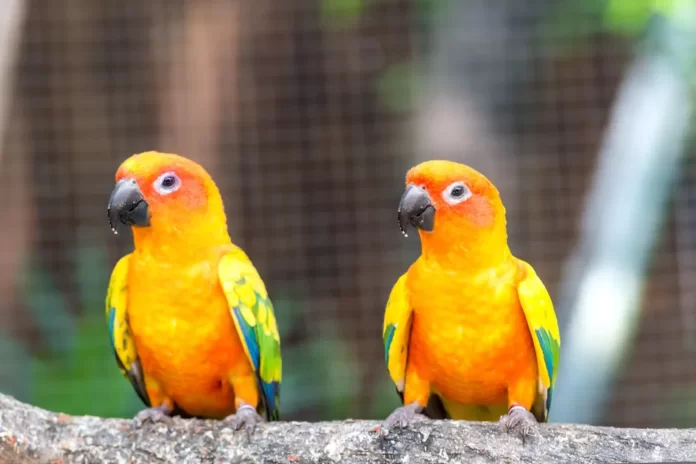Origin and History
The sun conure is native to northeastern South America, including Venezuela, northern Brazil, and Guyana. Found mostly in inland tropical habitats, the sun conure also may inhabit dry savanna woodlands and coastal forests. They usually inhabit fruiting trees and palm groves
The population of this currently endangered bird is dwindling rapidly due to loss of habitat and trapping for the pet trade. According to the World Parrot Trust, populations have dipped drastically over the past three decades despite the U.S. import ban of 1992 and the European Union ban in 2007.1
Temperament
The sun conure is a playful, amusing bird that enjoys athletic tricks. These birds are smart, interactive, and easily trained. Birds With Orange Beaks In general, it is a very affectionate and cuddly bird that is gentle to all members of the family as long as it’s treated well. The bird is not without assertiveness, though; it can turn aggressive suddenly if provoked.2
This parrot can go through nippy phases that can be hard on children as well as on adults. Even the tamest pet bird can get startled and bite. This is not a true reflection of its personality; it’s a natural reaction.
Like all parrots, sun conures
are social birds that need a considerable amount of interaction with their human owners to be happy. They are naturally playful and affectionate when they get the attention they need, making them uniquely suited for those who want a bird for steady companionship.
Keep in mind that the sun conure is extremely loud and capable of emitting ear-piercing screams. Its loud, shrill call is used in the wild to bring attention to important situations from miles away. Likewise, this bird can stand in as an excellent version of a watchdog for your home.
Speech and Vocalizations
In captivity, this bird’s loud, harsh calls may elicit return calls from angry neighbors. This bird is not suitable for flator condo dwellers. You can’t expect to “train away” their calls, but you can train them from early on to curb excessive screaming. They do express excitement and fear with shrill screams. Conures are not shy birds and will let you know vocally if they are bored or if their needs are neglected.
Sun conures are not known for their talking ability, but some birds demonstrate an uncanny ability to mimic other types of sounds, such as doorbells, microwave buzzers, and telephone chimes.
Sun Conure Colors and Markings
At maturity, a sun conure is bright orange and yellow with traces of green and blue. Juvenile sun conures are not nearly as colorful as adults—this is a natural defense mechanism. The first feathers are olive green in color, changing to a mixture of yellowish-orange at around 6 months of age.
Full-color plumage occurs at approximately 18 months to two years of age. Sun conures have black beaks and feet and characteristic white patches around each eye. The sexes are identical in color and markings. To determine sex, your bird would require genetic testing or a surgical sexing procedure.
Caring for a Sun Conure
The sun conure is an active bird that will be happiest in a roomy enclosure. At a minimum, give it a cage that is 30 inches by 30 inches in footprint with a height of at least 36 inches for a bird of a smaller size. Make sure the cage has relatively narrow bar spacing (3/4 to one inch) to prevent the bird from getting its head stuck between the bars.
As is true of most other parrot species, the sun conure needs safe out-of-cage areas to explore and investigate. This athletic bird loves to create its own tricks. Provide it a play gym on top of its cage so it can stretch its legs and wings.
Like most pet birds
sun conures require training if you want to have a positive and fun relationship with them. Use positive reinforcement techniques to train this parrot to do several athletic tricks. Fish With Big Forehead This bird will not respond well to scolding or any kind of negative reinforcement.
Sun conures tend to enjoy bathing and will splash about daily when provided with a shallow water bowl. They may also enjoy a spray shower from overhead misters as some other parrots do.
Common Health Problems
Like other conures and parrots, the sun conure can be prone to feather picking. More often than not, this is a sign that the bird is bored or is not receiving the attention it needs.
Conures are also prone to avian viral conditions like proventricular dilatation disease and psittacine beak and feather disease.3 They can also be affected by psittacosis bacterial infection, beak malocclusion (beak overbite), and aspergillosis fungal infection.4 If you suspect your bird is ill, you will need an avian veterinarian or exotics specialist to check out your bird. You should plan on having annual exams with this specialized vet.
